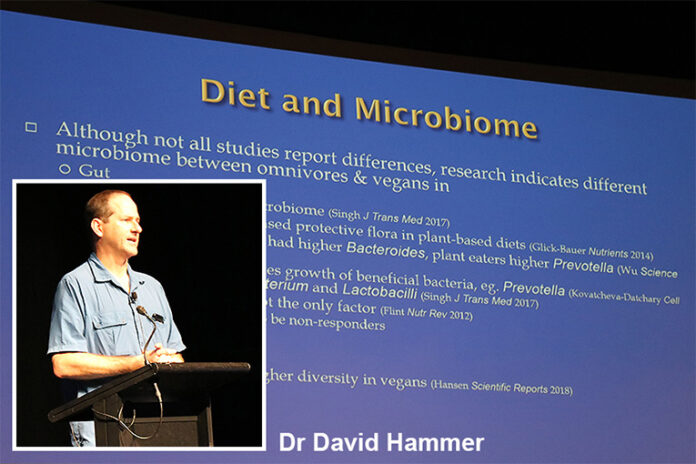Whangarei microbiologist and epidemiologist Dr David Hammer firmly believes tthat a plant-based diet is not only ideal for personal good health but has beneficial consequences for the planet as well.
In an address given at the annual Vegan Expo in the city last Sunday, Dr Hammer covered what he sees as “the new science of gut microbiology and food”.
In a broad and captivating forty-minute presentation, he asked what the epidemiology of a plant-based diet actually told us.
“Well, it tells us that a plant-based diet is associated with lower rates of obesity, diabetes, cardiovascular disease, stroke and heart attack, bowel cancer with possibly a link to breast and prostate cancer,” he said.
“With those factors, we have probably covered the bulk of the leading causes of death in society today.”
But he also urged his audience to be cautious when considering and reviewing various data themselves.
“Many, although not all, studies show that if you change what you eat, you change the bowel that carries the bug. And there are big differences between those that eat meat and those that have a plant-based diet.
“Studies show that there are increased amounts of protective flora in those that eat a plant-based diet. That long-term meat eaters have a higher number of bad bugs in their gut.
“Moving on to cola-rectal cancer, I don’t think I’m saying anything revolutionary to you when I say that a plant-based diet is protective of cola-rectal cancer. We’ve known that for decades probably.”
He said meat consumption, possibly by high fat increasing bile acid production, stimulate pro-inflammatory Clostridia, which increases toxic by-products such as H2S.
Dr Hammer said issues such as Inflammatory Bowel Disease (Crohn’s and Ulcerative colitis) were complex diseases where the gut microbiome also played an important role.
“I’m sure that we will find that there are genetic, environmental and other causes but increasingly, it has been shown that diet has a role to play in the development of inflammatory bowel disease.”
On the matter of heart disease, Dr Hammer said he, like some others, now questioned the role of cholesterol in the process, and he wondered about the value of dishing out large amounts of statins as a preventative measure in its control.
He said he wasn’t “completely dissing” the role of cholesterol in heart disease but wondered about the biosynthesis of red meat, dairy, eggs and fish and their role in the development of TMAO.
“TMAO is increasingly believed to play a role in inflammation and atherosclerosis.”
The production of TMAO is believed to be one of the precursors for diabetes, heart disease, kidney disease and stroke.
It had also been shown that the state of gut health also has an effect on the state of our mental wellbeing.
“There are numerous passages in the literature now which suggest that gut dysbiosis can lead to depression, anxiety and other mental health disorders,” Dr Hammer said.
Studies showed that decreased microbial diversity is associated with depression, and “research suggests that diet plays an important role in mood disorders.”
“So even our psychiatric colleagues are saying we should be looking at what we are putting into our mouths in terms of what we are doing to our brains.”
In conclusion, Dr Hammer warned against any hype surrounding plant-based diets.
“I’m not here saying that a plant-based diet will cure cancer. I suspect very strongly that it may help prevent cancers.
“There are all sorts of claims being made out there. We need to be intelligent about what we read, and we need to be critical even of the literature that we would like to believe.”
Overall, however, he said a plant-based diet had been shown to be beneficial in many but not all studies.
“Whilst some had a null finding, I encountered no studies whereby a plant-based diet was shown to be harmful to humans or our microbiota.”
And finally, although the science was still evolving, there were strong indications in the literature that diet influences gut microbiota which in turn affects our physical and mental health.






